Chinese Medicine uses food as a dynamic partner to acupuncture and herbs to achieve long lasting clinical results. Every new patient is consulted on the best choices that he or she can make regarding improving their condition through nutrition. Recommendations and documentation are given to patients to help guide on the journey towards sustained wellness.
Qi Deficiency
i.e. Fatigue, Somnolence
Qi is the term used in traditional Chinese medicine to describe your body’s energy. Qi flows around your body in a series of meridian pathways. These pathways are separate from your circulatory, lymphatic, and nervous systems and influence the way in which your body functions. The qi that is presently in your body is a combination of your genetic makeup at conceptions, how you have lived your life since birth and your daily intake of food and air.
Blood Deficiency
i.e. Anemia
The concept of blood in traditional Chinese medicine shares a close relationship with the western concept in that it has both a nourishing and moistening function. However, with the concept of blood deficiency, there is also emphasis placed on your body’s qi.
Blood is seen as a condensed form a qi with qi playing a vital role in helping the blood to circulate to where it is needed. Attention is also focused on the strength of your digestive system’s ability to successfully obtain the nutrients from your food necessary for the production of blood.
Cold
i.e. Stomach pain, fixed pain
In true cold the body’s yang energy, which is responsible for warming and activating bodily functions, has been overwhelmed by excess cold. Excess cold conditions can happen in several ways, including exposure to excess cold in the environment. Consider not only natural but also man made environments, for example working in refrigerated areas or air conditioning. An additional factor can be the excess consumption of cold food, drink, and raw food, such as ice cream, green salads or iced water in winter. Cold may also arise in response to an illness where the initial cold pathogen has not been resolved. The cold can then become retained, locked deep in the body.
Dampness
i.e. Heaviness, Bloating
Dampness represents a condition existing within the body that is a reflection of dampness as it occurs in nature. Dampness arises from the body being affected in several ways. It can be due to either a problem arising from the inability of the digestive system to transport and transport fluids, or from the body being overwhelmed by external damp from the environment, (damp weather, damp living conditions, damp-producing foods). It can also arise from a response to an illness, or from the overuse of medication that promotes dampness, such as certain antibiotics. Phlegm is seen as a condensed form of dampness.
Read more on Spleen Qi Deficiency
Heat
i.e. Being hot, thirst for ice cold beverage
In true heat the body’s yin energy, which is responsible for moistening and cooling the bodily functions, is not deficient, but has been overwhelmed by excessive heat.
Heat may arise in several ways, including exposure to excessive heat in the environment. consider not only natural but also man made environments, for example a working in artificially heated environments. True heat may also be due to an excess of heat producing foods and drinks such as alcohol and coffee. This can be further aggravated by tobacco. True heat can also arise in response to an acute feverish illness.
Other Guides
Alkaline/Acidic Foods Guide
TCM Food Guide
Recipes & Info
20 min Congee (rice porridge) recipe
- The secret? FREEZING the rice ahead of time: wash the rice, drain it, and put the washed rice in a zip-loc bag (or freezer-safe container). Then leave it in the freezer for at least 8 hours
- Pork can be substituted with yam
- the thousand-year-old eggs are preserved duck eggs (can be excluded)

